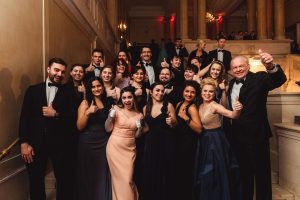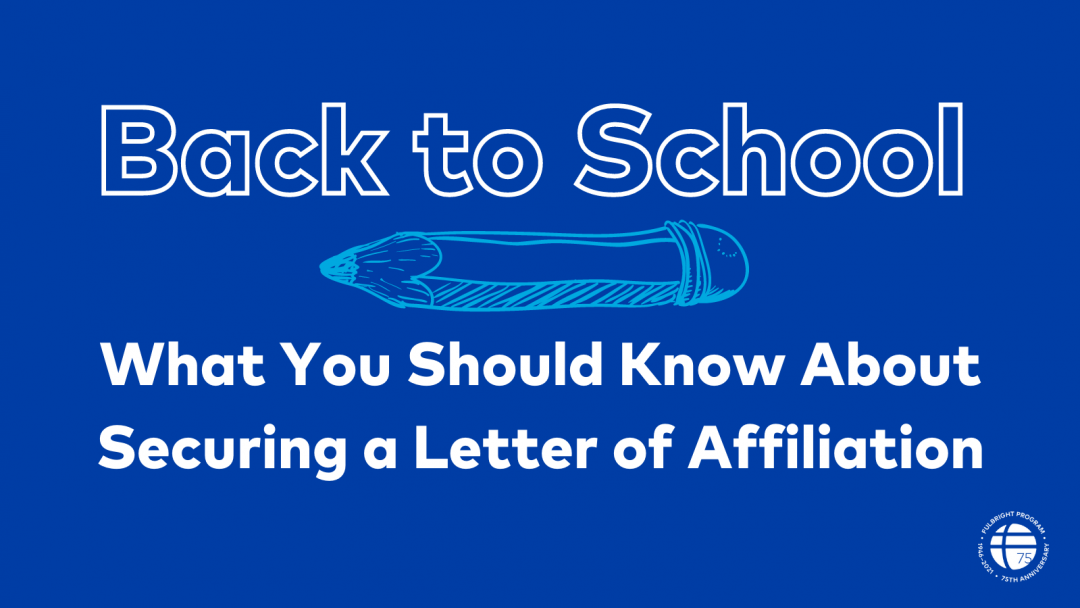By Fulbright Program Staff
Congratulations on deciding to further your education abroad by undertaking an independent research project or graduate degree through the Fulbright U.S. Student Program! You’ve confirmed your eligibility, determined your host country, and selected an award. Now what?
In this post, we will explain how to successfully navigate an important portion of the application process: securing a letter of affiliation from your prospective host institution. As the primary location for your Fulbright experience, successfully engaging a host institution and adviser is critical to your application’s success. Read on to learn how to secure your letter of affiliation:
Study/Research Award
The Study/Research Award allows young professionals to design an independent research project, working with advisers at foreign universities and institutions in approximately 140 countries. In general, this award requires a letter of affiliation with the prospective institution.
What is a Letter of Affiliation?
A letter of affiliation outlines a host institution’s support of your proposed Fulbright project. A letter should come from an individual or team at an institution with whom you will be working closely during your Fulbright.
- Examples of affiliations include universities, laboratories, libraries, archives, non-governmental organizations, etc.
Letters should be appropriate for your proposed project, and the letter writer should demonstrate a clear understanding of your work, outlining how the host institution will support the applicant and project.
Letter of Affiliation Requirements
All affiliation letters are:
- Dependent on country and award: Check the host country and award pages for the most up-to-date criteria.
- Printed on institutional letterhead: Make sure it has a signature from the appropriate contact!
- Not confidential: Applicants receive the letter and upload it into the online application prior to the national deadline.
An applicant may include up to three letters of affiliation if the letters are appropriate and necessary to their project. Adding unfocused letters may confuse application reviewers and distract from your application. For a comprehensive look at affiliation requirements, view the Application Components page and recorded Affiliation webinar.
Graduate Degree Grants
The Study/Research Award also includes the “Fulbright Graduate Degree Grants” subtype, which funds study at an affiliated foreign institution or degree program.
What is a letter of affiliation for graduate degree grants?
For applicants pursuing a graduate degree:
- Your letter of affiliation is the official acceptance letter proving admission into the graduate degree program. This not typically required at the time of the application. All candidates should review their award page for more information.
- Even if the Fulbright award does not require an official letter of acceptance by the Fulbright application deadline, all candidates are encouraged to reach out to their proposed adviser or department chair to inquire about receiving a letter of support prior to admission decisions, which may be uploaded into the application.

Chiamaka Ukachukwu, 2017 Fulbright U.S. Student to Belgium, celebrating International Day of Women and Girls in Science with her fellow lab mates in the Jean-François Collet Lab, Institut de Duve.
Tips and Best Practices
A few final pointers for a smooth affiliation process:
- Start early! This simple-but-crucial step will give you time to brainstorm, draft, revise, solicit feedback, contact potential host advisers, and everything else that goes into a compelling Fulbright application.
- “Start your search as early as possible, it will be really helpful. I emailed 15-20 professors at different universities in order to find my affiliation!” – Isra Hussain, 2018 Fulbright U.S. Student to Austria and 2020 Fulbright Alumni Ambassador
- Review the academic literature. Looking into topics and authors within your academic discipline is a great way to acquire more knowledge, better understand your Fulbright project, and determine which professionals may be a resource to you.
- “I spent a lot of time researching the background of these professors that had responded and reviewing their own research” – Isra Hussain, 2018 Fulbright U.S. Student to Austria and 2020 Fulbright Alumni Ambassador
- Utilize personal and professional networks. While the idea of creating an independent research project or graduate school application is daunting, your networks are here to help. On campus, reach out to faculty members, a reference librarian, and your Fulbright Program Adviser; off campus, get in touch with your professional and personal connections, Fulbright Alumni Ambassadors, former Fulbright U.S. Students and U.S. Scholars, and the Fulbright Association.
- “Tapping into your network is really important. Faculty network and faculty relations are a great place to tap into.” – Kurt Davies, Fulbright Program Adviser and Director of Global Awards at New York University
- Be flexible. Your patience and flexibility throughout the application process will help both you and your potential affiliate perform your best. Be sure to:
- Meet your host institution where they are, and adjust the scope of your project based on the resources available. Be prepared to share a basic overview of your proposed research/study project when contacting potential affiliates.
- Conduct yourself professionally and use a clear, positive tone.
- Explain the Fulbright Program, including Fulbright’s funding and grant benefits, which prevent financial obligation from the institution.
- “Open the conversation with a sense of what can I give to your organization, how can I contribute to your ongoing research.” – Kurt Davies, Fulbright Program Adviser and Director of Global Awards at New York University
- Cast a wide net. Finding a host affiliation takes time, so pursue multiple leads and ideas until you find the right institution and adviser.
We hope this article provides clarity into letters of affiliation, and helps you create the best application you can. Start early, do your research, and don’t give up. You can do it!

2019 Fulbright Austria participants at the TU Ball at the Hofburg Imperial Palace.

